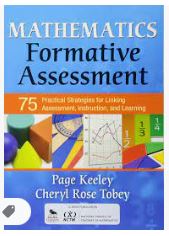Formative Assessment
Ongoing formative assessment is critical to student learning. The most effective teachers embed formative assessment and feedback in learning at all points. Receiving feedback allows students to learn and self correct while it still matters. Grading, on the other hand is an endpoint to learning. There is plenty of research showing how effective formative assessments and feedback are at promoting learning, and evidence also that grading actually inhibits learning.
Here is what research says:
- -One of the top ten most effective teaching strategies is providing feedback to students during the learning.
- -Grades alone do not increase learning.
- -Grades tend to decrease student interest in learning (Kohn, 1998)
- -Even grades accompanied by feedback do not increase learning. The feedback must be low-stakes, not attached to performance evaluation (William, 2011).
- -Providing feedback promotes student growth, self awareness, efficacy and agency by helping learners self-monitor. Feedback and formative assessments, as well as an awareness that errors are a natural and essential part of the learning process, are keys to instilling a growth mindset.
- -Feedback that best supports student learning is specific and descriptive (Black and William 1998)
- -Receiving feedback improves students’ metacognitive and self-regulatory skills (Hattie, 2017).
- -Formative assessment is an essential component of effective teaching. It raises standards of achievement for all students, but especially impacts low achieving students.
An excellent resource with fun and engaging ideas--75 Formative Assessments in Math, Keeley and Tobey
Article: 15 great formative assessment ideas in math https://ideagalaxyteacher.com/math-formative-assessments/
